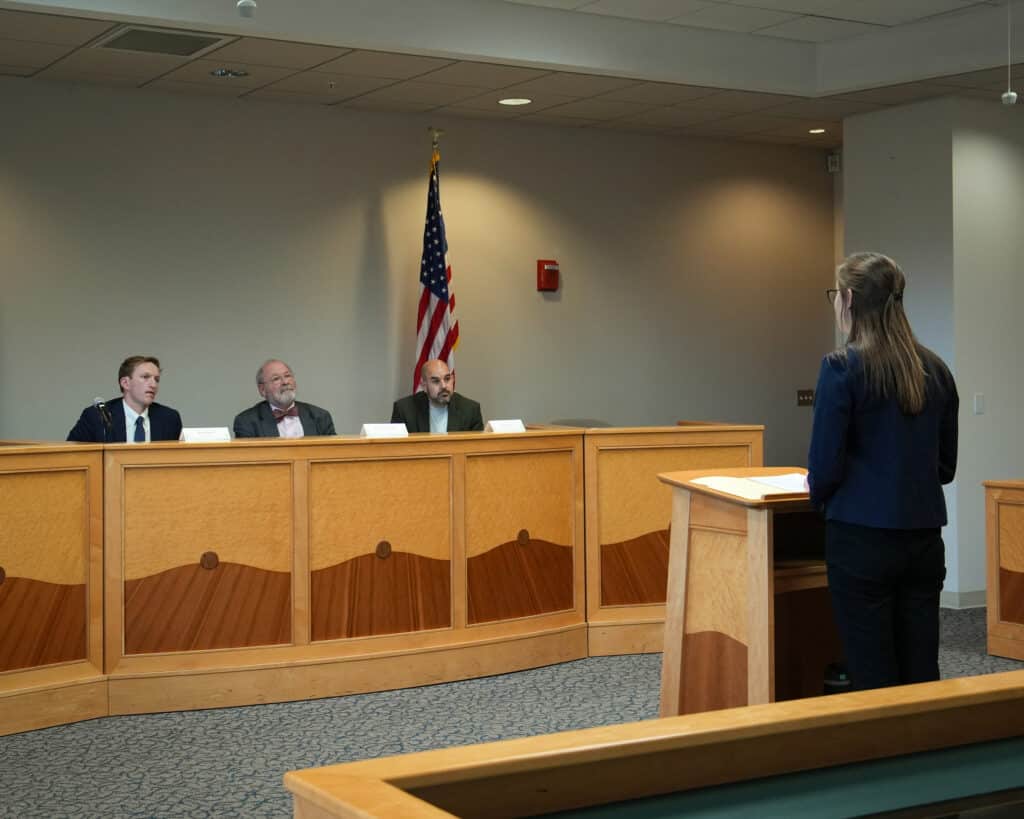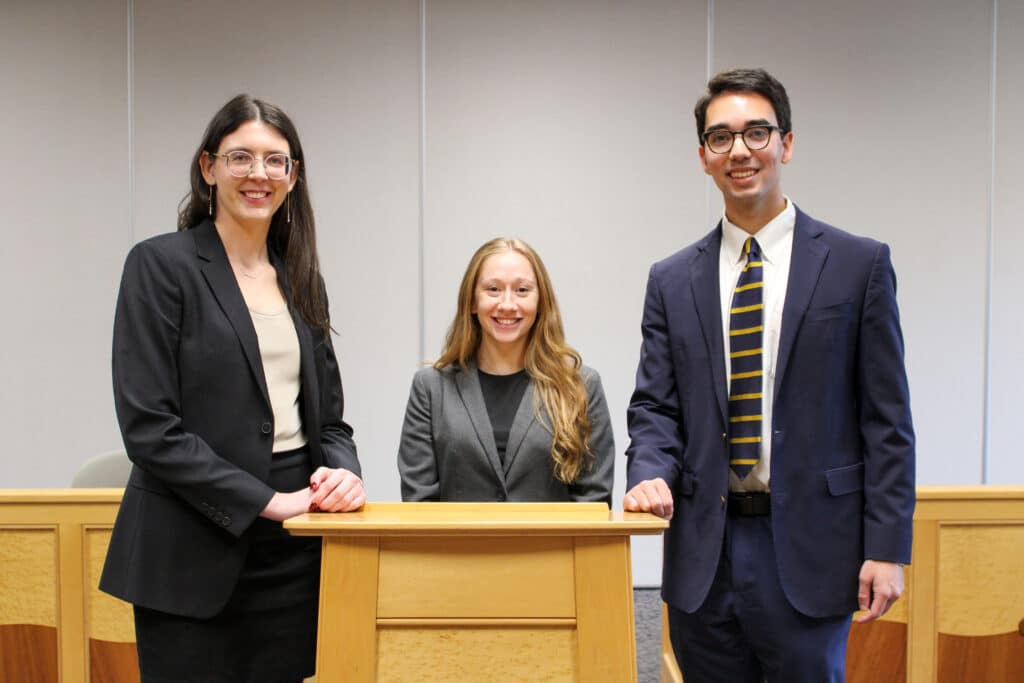
Legal Writing Program
Legal Writing Overview
Our dedicated staff of experienced professors is committed to making every student a better writer. We have developed a rigorous, three-semester program that engages students with real-world assignments.
These assignments—and the detailed feedback from the professors—are designed to make students “practice ready” for their summer internships or post-JD positions. Through this effort, VLGS students have a regional and national reputation for excellence in legal writing. We encourage you to explore these pages to learn how our program can help you master the art of legal writing.

VLGS is One of the Top Law Schools for State Court Clerkships – Law360 and The Princeton Review
Resources
Student Writing Competition Portal
Law Journals
Vermont Law Review
The Vermont Law Review is a student-edited legal journal published quarterly under the guidance of five senior student editors and in collaboration with Vermont Law and Graduate School faculty.
Vermont Journal of Environmental Law
The Vermont Journal of Environmental Law is a student-run organization that seeks to provide an accessible forum to discuss contemporary environmental issues and environmental justice.
Professor Accomplishments
Greg Johnson was elected to the Executive Committee of the AALS Section on Legal Writing, Reasoning, and Research for the 2025-26 academic year. Greg served as co-chair of the Awards Committee for the AALS Section in 2024. Greg is currently co-chair of the Distinguished Speakers Committee of the Association of Legal Writing Directors.
Anna Connolly recently published the following writing-related articles:
- Anna F. Connolly, Write On: Get Out of the Shadows–Break Up Legal Research and Writing (Vermont Bar Journal, Summer 2025)
- Anna F. Connolly, Context Matters for Deep Knowledge: What Cognitive Science Can Teach Us About Legal Writing, 68 St. Louis U. L.J. 475 (2024).
- Anna F. Connolly, Match Mindsets for Better Communication (Vermont Bar Journal, Summer 2024)
Anna Connolly presented at a conference: Legal Writing Institute Biennial Conference(Indiana University Robert H. McKinney School of Law, July 18-20, 2024).
Michael Kovac published the following articles:
- An article published in the Georgia Criminal Law Review – https://digitalcommons.law.uga.edu/gclr/vol2/iss2/2/
- The cover story for the Pittsburgh City Paper’s Black History Month edition – https://www.pghcitypaper.com/arts-entertainment/the-extraordinary-life-and-death-of-pittsburgh-basketball-legend-john-brisker-27420971
Claire Andrews’s fourth novel, A BEAUTIFUL AND TERRIBLE MURDER will be published August 5, 2025 from Little, Brown Young Readers.
Student Accomplishments
VLGS Students Excel in National Moot Court Competitions

“It was an honor to represent Vermont Law and Graduate School in the National Moot Court Competition. The experience was invaluable. Our group was given the opportunity to hone legal research, writing, and oral advocacy skills that will benefit us throughout our professional careers.” – Allyson Cohen JD’25
Legal Writing Program Announces Nominee For Burton Award

We are pleased to announce that Amanda Tynan is our official nominee for the Burton Award for Distinguished Legal Writing.
The Burton Award is the most prestigious award in legal writing. Law schools from around the country nominate one student paper for the award.
Against this stiff, national competition, Vermont Law and Graduate School students have won the Burton Award six times in the last thirteen years.
VLGS students are good writers, so selecting one paper out of many qualified submissions was difficult. But Amanda’s Note for the Vermont Law Review stood out because of the breadth of the research, the high quality of the writing, and the originality of the thesis.
Amanda’s Note, entitled “The Silence of Extinction: What the Kaua’i ‘Ō’ō’s Final Song Can Teach Us About Critical Habitat Designations Under the Endangered Species Act,” argues that the Endangered Species Act should be amended to include a habitat definition that reflects climate change’s impact on the habitat ranges of listed species. The Note discusses a range of species whose habitat has been altered by climate change. But the anchor of the paper is the poignant story of the now-extinct Kaua’i ‘Ō’ō. “In 1983,” Amanda writes, “the last male ‘Ō’ō’ sang out for a mate that would never come.”
We congratulate Amanda on becoming our school’s Burton Award nominee. We have high hopes that she will join the stellar list of VLGS recipients.
Faculty
Anna F. Connolly
- Associate Professor of Law
Jessica Durkis-Stokes
- Associate Professor of Law
- Title IX Coordinator
Tenielle Fordyce-Ruff
- Professor of Law in Legal Writing
- Director of Online Legal Writing
Catherine Fregosi JD’16
- Professor of Law
- Assistant Director of Legal Writing
Greg Johnson
- Director, Legal Writing Program
- Professor of Law
Michael Kovac
Brian Porto
- Professor of Law Emeritus
Claire Andrews
- Program Coordinator
Legal Writing News and Events

VLGS Reflects on Hosting the 2025 New England Legal Writing Conference
September 24On Friday, September 12, the Legal Writing Department at Vermont Law and Graduate School (VLGS) hosted the New England Legal Writing Conference. This year’s theme was Legal …

Meet the Speakers: 2025 New England Legal Writing Conference
September 10Vermont Law and Graduate School (VLGS) is proud to host professors from near and far for the the 2025 New England Legal Writing Conference. This year’s theme is �…

Faculty and Staff in the News – July 2025
August 4Below is a selection of recent news highlights featuring members of Vermont Law and Graduate School’s faculty and staff. Human Rights Economy: A Solution to Economic Cru…

U.S. News and World Report Again Ranks Vermont Law and Graduate School a Top Environmental Law School
April 9SOUTH ROYALTON, Vt. (April 9, 2025) — Vermont Law and Graduate School (VLGS) has been ranked No. 4 among the Best Environmental Law Schools by U.S. News and World Report, [&…



